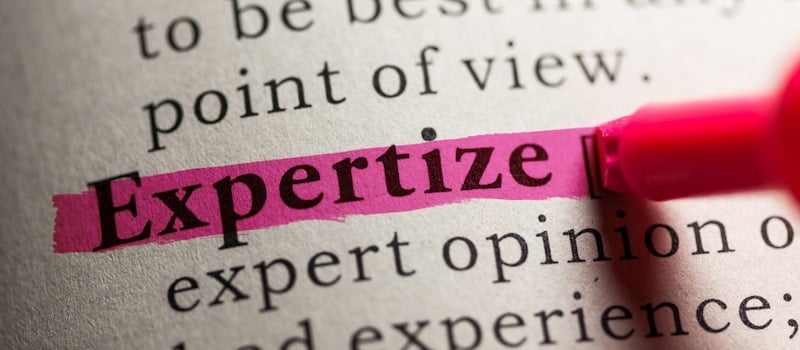A letter is a powerful thing. A letter can change the pronunciation and meaning of a word or turn it into complete nonsense. Which one applies to the words “expertise” and “expertize”?
The word “expertise” refers to a superior skill or knowledge. At the same time, “expertize,” spelled with a Z instead of an S in North America, means to authenticate or give an expert opinion on something.
Expertise is a noun, and expertize is a verb.
To be more precise, expertise means having expert knowledge about something. Example: “technical expertise.” Expertize is the act of giving an expert opinion about something: “expertize on farming.”
British grammar experts advocate ending the “ise/ize” in both the noun and the verb. Thus, they say that readers can comprehend the word “expert” depending on its written use.
Origin Of The Words
The first definition of “expertise,” “quality or state of being an expert,” is from 1868. The word comes from French and dates back to the 16th century. The term “expertize” first known use is from 1889.
Both terms come from the word expert that can be an adjective and a noun.
As an adjective, the word “expert” dates back to the 14th century, coming from the Old French words expert/espert, meaning “experienced, practiced or skilled.” The adjective also comes directly from Latin “expertus” meaning “tried, proved, known by experience.”
The word “expert” as a noun is first known in the early 15th century, meaning “a person wise through experience.”
In 1825, the Century Dictionary defined “expert” in a legal sense as: “a person who, under special acquired knowledge on a subject may testify in a court of justice to matters of opinion, as distinguished from ordinary witnesses, who can, in general, testify only to facts.”
What Is An Expert?
An expert is a person who has intense experience through practice and education in a particular field. Informally, an expert is someone that is recognized as a person with extraordinary skills or techniques by a group of peers.
Generally, an expert is someone with extensive knowledge and abilities gained through research, experience, and occupation in an exclusive study area.
A person is believed to be an expert when they have to achieve years of training and education. However, the proof of being an expert is through publication or experience, which shows an exceptional knowledge of a subject beyond the one acquired by an average person.
There are specific fields in which a person can be considered an expert without professional or academic recognition. What is always needed is experience and the consensus of a crowd.
A shepherd with decades of experience can be an expert in training sheepdogs and caring for sheep.
Historically, experts were known as “Sages,” a person wise through reflection and experience. Sages were typically profound thinkers distinguished for their wisdom and judgment.
How To Use The Words “Expertise” And “Expertize” In Sentences
Knowing that the word “expertise” means “Great skill or knowledge in a particular field or hobby,” we can use it in these sentences:
- We highly recommend you visit another mechanic because we don’t have sufficient expertise to fix your car here.
- Many parents will be visiting the public pool with their families. They need to hire someone with lifeguarding expertise for this summer.
- If you want to eat something new, go to Mario’s restaurant. He has expertise in Spanish cuisine.
- I’ve been practicing Jiu Jitsu for the past two years because I want to achieve expertise in Mixed Martial Arts.
- A lot of public figures without any expertise in Biology have been misinforming people on social media.
According to the Oxford Dictionary, the term “expertize” means “give an expert opinion on something.” The word “Expertizing” is another form for “expertize.” Here are some example sentences:
- Yesterday, our college teachers expertized the use of the campus for public dissertations.
- Charles has been studying abroad for a couple of years now. During our Zoom meeting yesterday, he expertize in foreign politics.
- Clara was acknowledged as a professional singer by an expertizing table of juries.
What Are Other Words I Can Use To Express The Same As Expertise?
The terms “know-how,” “skills,” and “savvy” are synonyms that refer to expertise/expertize.
Know-how means: “knowing how to do something efficiently.” It is an informal way to refer to someone’s expertise. Here are a couple of sentences:
- He still doesn’t have the know-how to run the business.
- Ronald really has the know-how for playing baseball.
Skills are the abilities to use knowledge effectively and readily in execution or performance. For example, a famous movie quote:
- “I don’t know who you are. I don’t know what you want. If you’re looking for ransom, I can tell you I don’t have money, but what I do have are a very particular set of skills. Skills I have acquired over a very long career. Skills that make me a nightmare for people like you. If you let my daughter go now, that will be the end of it – I will not look for you, I will not pursue you, but if you don’t, I will look for you, I will find you, and I will kill you. “
Savvy: showing comprehension in practical matters. Example:
- You should ask Janice about buying a house.She’s a savvy investor.
Antonyms
The most common term as an opposite of “expertise/expertize” is “inexperience.”
Inexperience means a lack of practical experience and knowledge of the ways of the world. Example: Frank didn’t make it in the job because of his inexperience.
How To Gain Expertise?
Expertise is constantly defined as being an elite person in a performance, task, or job. Thus, expertise is being at the highest level for a given assignment. Examples of people achieving expertise at a craft are Tiger Woods in Golf and Bette Davis in acting.
Expertise is achieved by years of practice and studying. It requires years of experience in a given task. Not to be mistaken with being a prodigy, someone whose talent comes naturally since birth.
To gain expertise in a given task, you need to focus on the one area you want to develop and dedicate time to it. Here are some basic pointers to develop expertise:
- Schedule time. In that time, schedule the area you want to develop.
- Research the knowledge you want to build.
- Ask questions
- Sign up for a course
- Attend industry events
- Build a knowledge base.
- Join a community of said knowledge
- Find a mentor
- Offer services
Remember being a kid and going to karate, baseball, or football. Remember what your parents do or what you do as a parent now. Investigate and dedicate time for the craft you want to develop and become an expert in.
Conclusion
The words “expertise” and “expertize” refer to an extraordinary knowledge of a person. Both terms come from the word “expert.”
“Expertise” refers to the attribute of expert knowledge from a person, while “expertize” is the action of expressing an expert opinion. Unfortunately, the term “expertize” is not so commonly used nowadays.
If any confusion arises, it is safe only to use the word “expert.”
Shawn Manaher is the founder and CEO of The Content Authority. He’s one part content manager, one part writing ninja organizer, and two parts leader of top content creators. You don’t even want to know what he calls pancakes.



